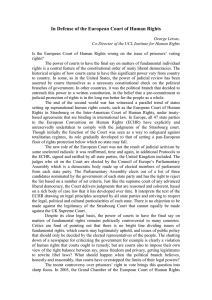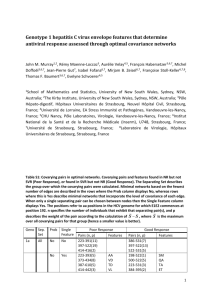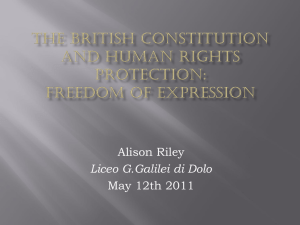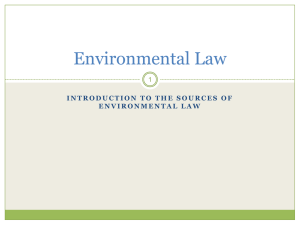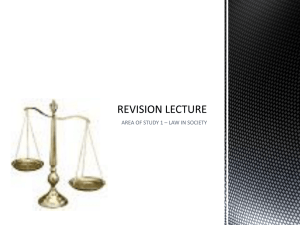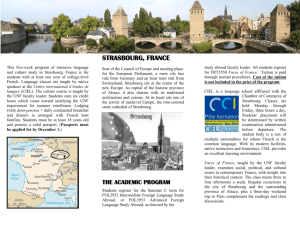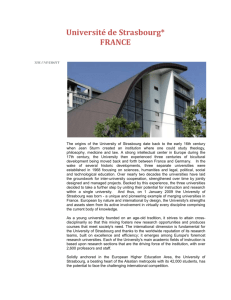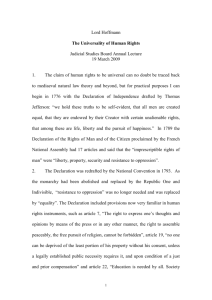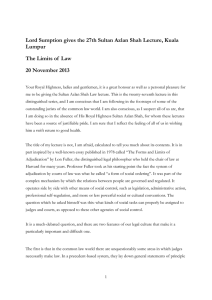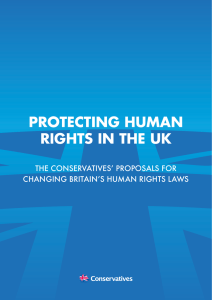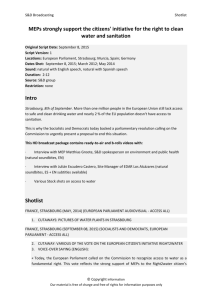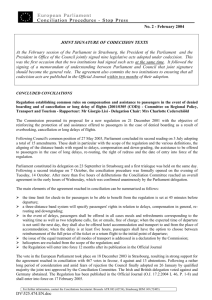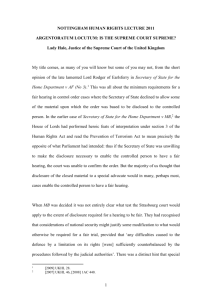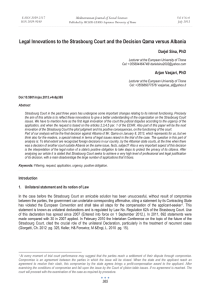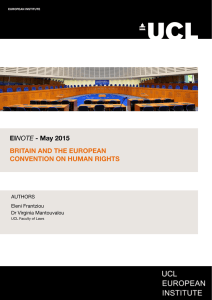Yours sincerely - Equality and Human Rights Commission
advertisement
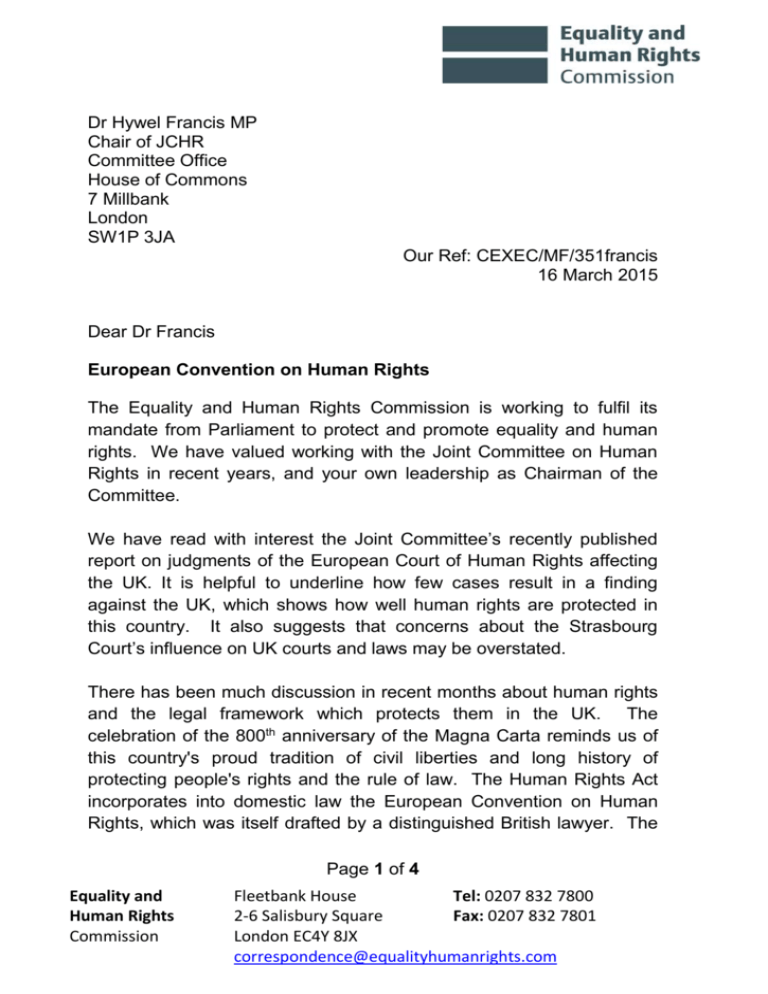
Dr Hywel Francis MP Chair of JCHR Committee Office House of Commons 7 Millbank London SW1P 3JA Our Ref: CEXEC/MF/351francis 16 March 2015 Dear Dr Francis European Convention on Human Rights The Equality and Human Rights Commission is working to fulfil its mandate from Parliament to protect and promote equality and human rights. We have valued working with the Joint Committee on Human Rights in recent years, and your own leadership as Chairman of the Committee. We have read with interest the Joint Committee’s recently published report on judgments of the European Court of Human Rights affecting the UK. It is helpful to underline how few cases result in a finding against the UK, which shows how well human rights are protected in this country. It also suggests that concerns about the Strasbourg Court’s influence on UK courts and laws may be overstated. There has been much discussion in recent months about human rights and the legal framework which protects them in the UK. The celebration of the 800th anniversary of the Magna Carta reminds us of this country's proud tradition of civil liberties and long history of protecting people's rights and the rule of law. The Human Rights Act incorporates into domestic law the European Convention on Human Rights, which was itself drafted by a distinguished British lawyer. The Page 1 of 4 Equality and Human Rights Commission Fleetbank House Tel: 0207 832 7800 2-6 Salisbury Square Fax: 0207 832 7801 London EC4Y 8JX correspondence@equalityhumanrights.com Act has provided essential protection to everyone in Britain, enabling fundamental rights to be enforced in our domestic courts. We recognise that there is debate and a level of public concern about interpretations of human rights law. This emerges with particular force around issues such as the role of Article 8 in deportations of foreign citizens convicted of crimes in this country, and how Article 10 protects freedom to express views which some may find offensive. As Britain’s national body charged with safeguarding and enforcing the laws which protect the rights we all share to fairness, dignity and respect, we wanted to underline our commitment to helping the Joint Committee to consider any future proposals to alter the current constitutional and human rights settlement after May. We are committed to helping both Parliament and any future Government to uphold human rights. We think it would be useful to set down some key principles in advance of new proposals emerging. The Commission’s clear position is that any changes to our current human rights framework must not reduce the protections contained in the Human Rights Act, nor weaken the mechanisms for securing redress for breaches of human rights. However, any changes might offer an opportunity to consider the case for bringing additional rights (such as those protected by UN treaties) into our laws, or for strengthening arrangements for the enforcement of current rights. The Human Rights Act has consistently proved its value by providing an essential safeguard in areas such as protecting older and disabled people who are receiving care, protecting the freedom of our press, and defending the right of British servicemen and women fighting abroad to have the appropriate equipment when risking their lives on behalf of the nation. The Act has enabled British people to protect their rights by making claims in British courts, rather than having to go through the costly and time-consuming process of going to the Strasbourg Court. The mechanisms for enforcement of any alternative to the Human Rights Act must be accessible and effective. Unless this is ensured, the rights Page 2 of 4 set out in any new Act would be without real remedy. This would breach a core legal principle and constitute a regressive step in the protection of fundamental rights. We do however need to confront and address concerns and confusions. One example is the suggestion that changing the Human Rights Act would make it possible for the UK courts, not Strasbourg, to have the final say in determining the application in this country of Convention rights. It is important to note that this is already the case. UK courts do not have to follow the judgments of the Strasbourg court. Our courts only need take account of such judgments. In the recent case on whole-life tariffs, the Strasbourg Court has accepted the view of our own Court of Appeal that UK law is indeed consistent with Convention rights. This case shows the attention paid by Strasbourg to national courts, which is one of the reasons there are so few judgments against the UK. Even on the rare occasion when this happens, the Strasbourg Court cannot compel our Parliament to change the law. The recent ruling from the European Court of Human Rights on prisoner voting comes after asking for a change in the law for years, during which no UK Government has put forward the requisite legislation. This shows that Strasbourg may suggest, but cannot command, legal change; decisions remain in the hands of the UK Parliament and Government. The future protection of human rights in the UK also needs to be considered carefully in the context of other constitutional questions, including further devolution in Scotland and Wales and to the English regions as well as our relationship with Europe. All UK devolution settlements are tied to the Human Rights Act and the European Convention on Human Rights. In considering changing or repealing the Human Rights Act, Parliament would need to be mindful of broader constitutional implications for the UK. The Commission welcomes a debate on such important issues, but would not support a reversal of the leading global role Britain has long played in protecting and promoting human rights, nor a reduction in the protections of rights that we all currently enjoy under the Human Rights Page 3 of 4 Act. We must safeguard both our reputation for fairness and our moral authority when confronting human rights abuses abroad. We stand ready to help the Committee and any new Government in tackling these complex questions and challenges. Given public interest in this issue, we will be publishing this letter on our website and making it available to other relevant organisations. Yours sincerely Baroness Onora O’Neill Chair Mark Hammond Chief Executive Page 4 of 4
